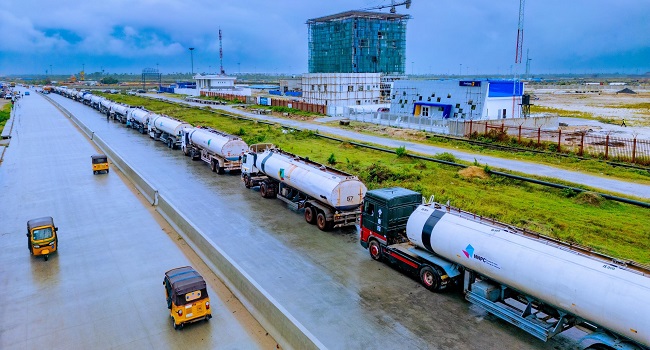Oil marketers can now buy petrol directly from local refineries – FG

NNPCL trucks lining up for petrol loading at the Dangote Refinery. X/@nnpclimited
In efforts to fully deregulate the downstream sector, the federal government says oil marketers can now buy petroleum products directly from the Dangote refinery and other local producers with doing to the Nigerian National Petroleum Company (NNPC) Limited.
Announced in a statement on Friday, the development puts an end to NNPC’s sole distributor role which the national oil firm had held for many years in Nigeria’s oil industry.
It also comes amid reports that the state-owned oil firm had quit its middleman role to the Dangote refinery.
The federal government had commenced the sale of crude oil to local refineries — including the Dangote refinery — in naira on October 1, in attempts to address petrol supply challenges occasioned by NNPC’s financial straits.
In the arrangement, the government said the Dangote refinery would sell petrol to only the NNPC in the local currency, noting that interested marketers would have to buy the product from the national oil firm.
Providing updates on the implementation of deal in the statement, Wale Edun, the minister of finance, said the scheme established a plan for domestic production.
The minister spoke during the second post-commencement review meeting of the implementation committee on Thursday, aimed at evaluating the progress of the naira-based crude oil and refined products sale initiative.
“New Direct Purchase Model: The most significant change under the new regime is that petroleum product marketers can now purchase PMS directly from local refineries,” he said.
“This marks a departure from the previous arrangement where the Nigerian National Petroleum Corporation (NNPCL) served as the sole purchaser and distributor of PMS from the refineries.
“This direct purchasing mechanism allows marketers to negotiate commercial terms directly with the refineries, fostering a more competitive market environment and enabling a smoother supply chain for petroleum products.
“With the commencement of local PMS production, the market is better equipped to support these direct transactions.
“This transition is expected to enhance efficiency in product availability and stabilize market conditions for the benefit of all Nigerians.”
Edun said the committee is open for questions and discussions regarding this change in the market structure.
He said the committee is committed to providing clarity on the development and will continue to engage with stakeholders to ensure a seamless transition process.











